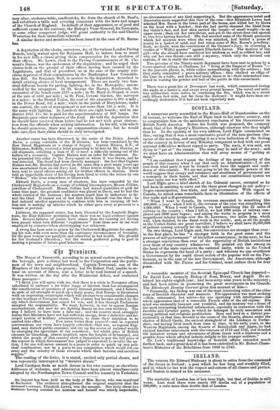SCOTLAND.
A numerous party assembled in the, Music-Hall of Dumfermline on the- 2d instant, to welcome the Earl of Elgin back to his native country, and to congratulate him on the satisfactory conclusion of his Government in British North America. Before his health was proposed, the company drank that of her Majesty's Ministers, although unaware who they might then be. In the opening of his own address, Lord Elgin commented on this ; saying that it was a most conclusive proof of the non-partisan cha- racter of the meeting, and accepting it as a true indication of the feeling of the country in favour of any Ministry competent to deal with our great national difficulties without regard to party. The navy, it was said, are dying to "get at" the enemy. The same may be said of the army ; and, we must have an Administration that will array means of "getting at them."
"I am confident that I speak the feelings of the great majority of the people of this country when I say that such an Administration—I do not care from what party it may be formed—will have the support and confi- dence of this country. We are not going to let the despotic powers of the world suppose that energy and constancy and steadiness of government are a monopoly in their hands and that under our constitutional system we- cannot carry out war with effect," Lord Elgin gave a brief sketch of his Colonial career, occupied as he bad been in assisting to carry out the three great changes in our policy— Negro emancipation, free trade, and self-government. With regard to Canada, he stated some remarkable facts in illustration of the effects of free trade and self-government. "When I went to Canada, its revenues amounted to something like 400,0001. a year ; when I left it, the revenue of the year was something like 4,000,0001. When I went to Canada, we had something like 22 miles of railway in the country ; when I left it, we had 1000 miles of railway com- pleted and 2000 more begun ; and among the works in progress is a most magnificent tubular bridge over the St. Lawrence, two miles long, which will, when finished, be the finest work in the world ; and, as all the people in the United States are great travellers, I believe we shall have 25,000,000 of persons coming annually for the sake of seeing it." On two things, Lord Elgin said, his convictions are stronger than ever : in the first place, he has "a stronger faith in the good sense and the powers of self-government" of his fellow countrymen ; in the next, he has.. a stronger conviction than ever of the superiority of British institutions over those of any country whatsoever. He pointed out that among us. the head of the state represents the national unity, while in the United States he represents the head of a party ; and whereas we can overthrow a Government by the rapid direct action of the popular will on the Par- liament, as in the case of the late Government, the Americans, although- dissatisfied with Mr. Pierce and his Cabinet, must endure them for four years.
A venerable member of the Scottish Episcopal Church has departed— Dr. David Low, formerly Bishop of Ross, Moray, and Argyll. He at- tained his eighty-eighth year; had been sixty-nine years in the ministry and had been active in promoting the great movements in his Church. The Edinburgh Evening Courant gives this account of him-
" Personally, the Bishop was one of the most interesting relics of the elder days of Scottish character and manners. His appearance was most striking —thin, attenuated, but active—his eye sparkling with intelligence—his whole appearance that of a venerable French abbe of the old regime. His mind was eminently buoyant and youthful, and his memory was a fount of the most interesting historical information, especially in connexion with the- Jacobite and Cavalier party, to which he belonged by early association and. strong political and religious predilection. Born and bred in a district pre- eminently at that time devoted to the cause of the Stuarts, almost under the shadow of Edzell Castle, the ancient stronghold of the Lindsay's in Forfar- shire, and having lived much from time to time, in his early years, in this Western Highlands, among the Stuarts of Balachulish and Appin, he had enjoyed familiar intercourse with the veterans of 1715 and 1745, and detailed the minutest events and adventures of Wiese times with a freshness and a. graphic force which afforded infinite delight to his younger auditors."
Dr. Low's traditional knowledge of Scottish affairs extended much farther back, and a great deal of it has been embodied in Mr. Robert Cham- bers's Histories of the Rebellions from 1638 to 1745.


































 Previous page
Previous page